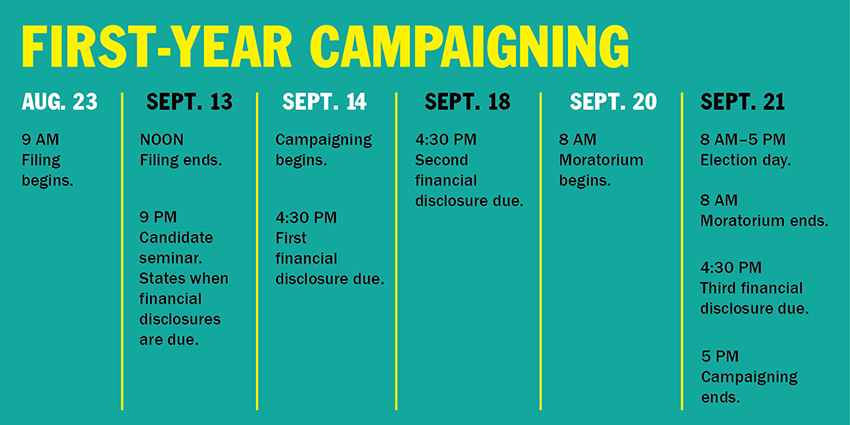The UT Supreme Court broke from past procedures and levied harsher punishments upon this year’s first-year representative candidates for not turning in their campaign spending reports on time. The ruling resulted in the suspension of campaigning and a reduction in spending limits for five candidates the day before elections.
Students who run for first-year representative positions are required to submit forms detailing donations and campaign expenses three times to the Election Supervisory Board throughout their campaign. This year, five students failed to submit campaign spending reports by the required second deadline.
“Almost every election, the financial disclosures are turned in late by some candidates,” said Justice Blake Richard, a supply chain management senior. “We decided this time to establish a more firm precedent of exact punishments.”
Election Code violations are categorized from A to D by increasing severity and punishment. This year’s candidates were all issued a Class C violation, resulting in a 24-hour campaign suspension from Tuesday to Wednesday morning, as well as a 20 percent reduction from their $204 spending limit.
Business freshman Nahiyan Khan and finance freshman Camron Goodman, neuroscience freshman Riley O’Hara, undeclared sophomore Seth Sageser and communication studies sophomore Austin Sappington have all been penalized for failing to submit these reports on time. Candidates had to submit their second and final financial disclosure by Tuesday afternoon.
In past years, violators were punished with a 10 percent spending limit reduction and no campaign suspension. The Supreme Court has the ability to disqualify candidates for any failure to meet a financial disclosure deadline.
“I think being overly aggressive like giving Class C’s is not the best policy,” said law student Zachary Stone, who was chief justice in fall 2014 and spring 2016. “It’s unnecessarily harsh [but] it’s within their authority.”
The Court, however, is not bound entirely by previous decisions and must be flexible depending on the situation, according to Justice Kris Bindeman.
“We want to make sure our court can be dynamic over time and that we can do the best we can to serve the best interest that we are really here to serve,” said Bindeman, a law student.
Last week, the Supreme Court explained the Election Code’s rules to candidates at a required seminar. Candidates agreed upon these conditions and were also alerted an hour before the 4:30 p.m. deadline to turn in their forms, Richard said.
“It was so obvious what was required of them and when they needed to turn them in that we feel it was a fair punishment,” Richard said.
David Engleman, chair of the Election Supervisory Board, which is inactive for the first-year representative election, said the Supreme Court still unfairly penalized this year’s candidates by being inconsistent.
“If the court is making the penalty harsher for one year to the next, it’s not fair to the candidates,” Engleman said. “But the biggest question is whether it is constitutional for them to make that change.”
Goodman, one of the first-year candidates who received the violations, said the 24-hour suspension just before elections is unfair.
“I think it’s kind of drastic the day before to get a hold on my campaign because it slows the momentum a little bit,” Goodman said.















